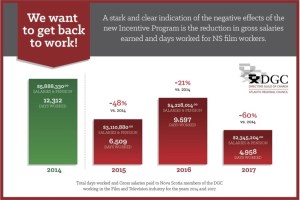
There is something vaguely Trumpian in Premier Stephen McNeil’s continuing, reality-be-damned insistence his government’s 2015 consultation-and-logic-free decision to dump a longstanding, working-well film tax credit, then replace it with a more restrictive, less incentivizing “Nova Scotia Film and Television Incentive Fund” is all working out just fine, the way we planned it, thank you very much.
“I believe we’ve seen lots of activity here in the province,” McNeil told the CBC’s Jean Laroche last week. “The industry has adapted to the new formula.”
Laroche’s excellent backgrounder on the state of the film industry appeared on the heels of the final, official close-the-books $5.3-million payout of the last of the tax credits, which happened without fanfare sometime in the 2017-18 fiscal year.
During its 20-year existence, the tax credit had helped create a thriving new industry in Nova Scotia, one that not only paid its small army of actors, directors and crew a living wage, which allowed them to meet their mortgage payments and educate their children, but it also spread the spending wealth among myriad, seemingly unrelated enterprises: car rental companies, hotel operators, grocery stores, restaurants, bars, clothing shops, antique dealers and hardware stores all over the province.
Stephen McNeil claim he has seen “lots of activity here in the province” under his new incentive scheme? The statistics tell a different story.
In 2014, the last full year under the old system, ACTRA, the actors’ union, reports its members worked 6,555 working days. Last year, the comparable number was 2,424 — a 63 per cent decrease from 2014.
IATSE Local 849, the union that represents most film technicians in the province, has statistics showing its members worked 40,687 days in 2014, earning $11,120,665 in gross pay and pensions. In 2017, those numbers had tumbled over a cliff: just 13,454 days worked with gross pay and pensions — $3,842,454 — 65 per cent lower than in 2014.

The Directors Guild of Canada (Atlantic) reports that 2017 marked “the lowest level of scripted television series and film production produced in Nova Scotia in over 10 years,” and noted that, because of the changes in the industry-support structure, Nova Scotia producers “are challenged to attract the larger television series and feature films that have been critical in the past to building the infrastructure and experienced crew base” the overall industry needs.
The DGC pointed out that large-budget projects — the ones Nova Scotia now finds harder to attract, thanks to McNeil’s funding jiggery-pokery — “bring in a much higher and immediate inflow of investment to Nova Scotia, [triggering] three to four times as much additional investment from outside Nova Scotia, most of which will be spent hiring our residents, and purchasing services and goods in this province.”
Lots of activity?
Premier McNeil may be right, however, in suggesting “the industry has adapted to the new formula.” Many have adapted by reluctantly abandoning their home province to find work in centres with a more attractive film tax credit, and consequently a booming film and TV production environment.
Shelley Bibby, the business agent for IATSE, told me last week she’d received an email the day before from Vancouver. “They were looking for the names of our props people. They need them.” And we, it seems, have them to spare.
Although IATSE has already lost some members to Vancouver, Toronto and other more film-friendly centres, Bibby says many have kept their Nova Scotia memberships current in hopes the situation here will improve. Hope springs eternal.
But the chances of that happening anytime soon — with a stubborn premier who can’t acknowledge his own mistakes — seem to veer between slim and none.
The Directors’ Guild has called on the province to create an equity investment fund to replace the one the government cavalierly eliminated as well as to increase the base incentive fund percentage rate to attract new productions so “the industry can return to pre-2015 activity and prevent the out-migration of the professional crew base.”
“The current incentive is less appealing to major producers because it’s not competitive with the incentive’s offered in other jurisdictions (be it labour based tax credit or all spend incentive),” . “When we had a tax credit it was extremely competitive,” says Laura Mackenzie, executive director of Screen Nova Scotia, the industry promoting organization. “We can compete with our incredibly beautiful, untouched locations, and world-class cast and crew but, at the end of the day, international players look at their bottom line, and currently Nova Scotia is just not as economically viable as other jurisdictions.”
Screen Nova Scotia has been holding ongoing meetings with various provincial government departments — Nova Scotia Business Inc., Communities, Culture and Heritage — to try to convince them, with facts and real numbers, that the new system simply isn’t working as well as the old one, and that changes must be made. “We feel that there is interest from the Government to make some of the improvements we need, and that’s encouraging,” Mackenzie says, “but unfortunately it’s a slow process, and every production season we move through without these advancements, mean more jobs lost.”
More jobs lost. More opportunities lost.
Meanwhile, Stephen McNeil lives in a Hollywood of his head, where there’s “lots of activity” and the industry is adapting to his enhanced reality.
Correction: This post has been updated to correct the percentage decrease since 2014 in the number of ACTRA members’ working days per year.




 STEPHEN KIMBER, a Professor of Journalism at the University of King's College in Halifax and co-founder of its MFA in Creative Nonfiction Program, is an award-winning writer, editor and broadcaster. He is the author of two novels and eight non-fiction books. Buy his books
STEPHEN KIMBER, a Professor of Journalism at the University of King's College in Halifax and co-founder of its MFA in Creative Nonfiction Program, is an award-winning writer, editor and broadcaster. He is the author of two novels and eight non-fiction books. Buy his books